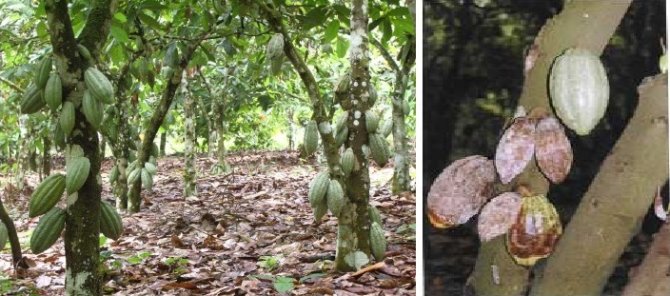Project
Biological Control of Pathogenic Fungi and Oomycetes
rest in biological control of pathogens by antagonistic bacteria has been stimulated in recent years by trends in agriculture and horticulture towards greater sustainability and public concern about the use of hazardous pesticides. The overall aim of this research topic is to identify antagonistic bacteria in diverse agro-ecosystems and aquaculture to exploit their potential to control economically important pathogens of plants and fish.
In a project funded by the Vietnamese Government (MOET), we are developing new methods to control soil-borne diseases of groundnut. The project specifically focuses on biological control of Sclerotium rolfsii, causal agent of root and pod rot. Beneficial bacteria indigenous to the groundnut agro-ecosystem are isolated, characterized and tested for their activity against S. rolfsii, both in small-scale greenhouse assays as well as field trials.
Black pod disease of cacao (Theobroma cacao) causes substantial yield worldwide and it is the main limiting factor in cocoa production. The aim of this project is to study the genetic diversity of Phytophthora, causal agent of the disease, and to explore and exploit the diversity of beneficial microorganisms in the cocoa ecosystem to develop novel strategies to manage black pod disease. The goal is to develop an integrated control strategy by combining selected antagonistic microorganisms, phytosanitary measures and fungicides.

In a project funded by the European Union (EU), the research focus is to develop novel and sustainable measures to control Saprolegnia parasitica, an important oomycete pathogen of fish. In this project (www.abdn.ac.uk/oomycetes/SAPRO.html), the ecological, molecular, immunological and biochemical factors/traits underlying pathogen-host interactions are investigated. The objectives of our sub-project are to: i) isolate and characterize beneficial bacteria from fish or fish eggs, and ii) identify bacterial metabolites with activity against Saprolegnia. The goal is to develop sustainable control strategies for Saprolegniosis that will be tested and validated by the industrial partners within the proposed time frame of the program.
In a VIDI-project with the Phytophthora Group, the phenotypic and molecular responses of the late blight pathogen Phytophthora infestans to metabolites produced by beneficial bacteria are investigated. Microarray-based analyses of Phytophthora exposed to cyclic lipopeptide surfactants has resulted in the identification of a number of differentially regulated genes. The role of these genes in the biology and interaction of Phytophthora with the host plant are being analysed to identify new molecular targets for pathogen control.